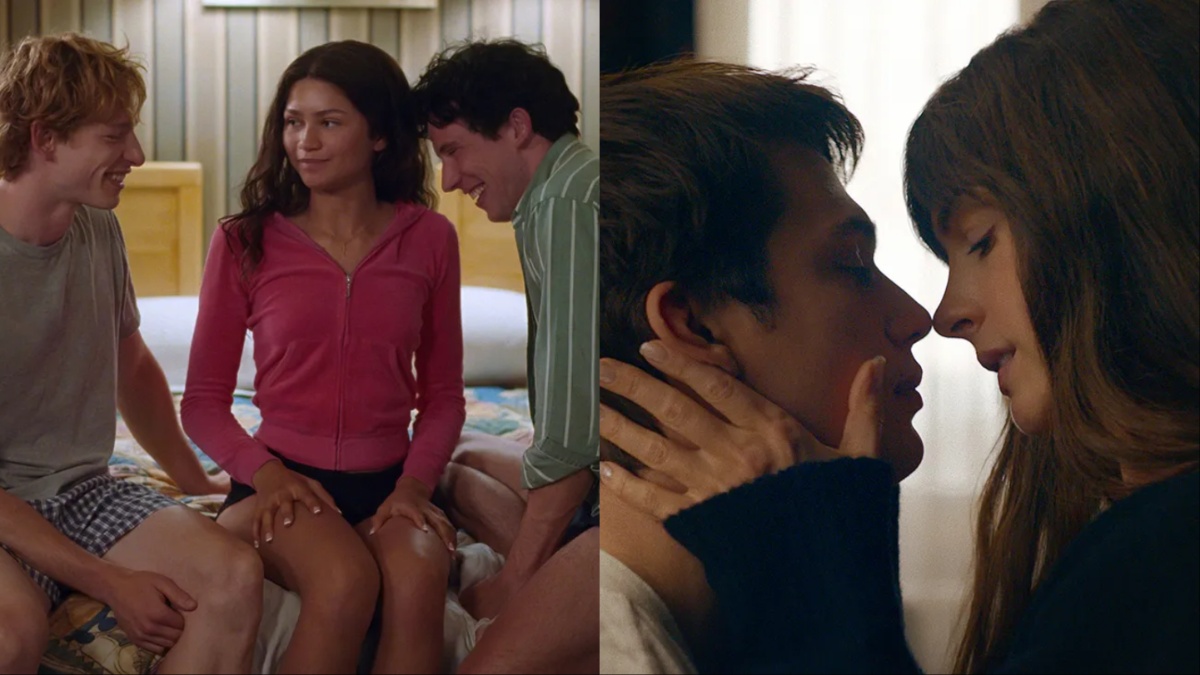Women Are Horny on Main in ‘Challengers’ and ‘The Idea of You’

On the surface, it would appear that Challengers and The Idea of You don’t have much in common. The former, directed by Luca Guadagnino (Call Me by Your Name, Suspiria) is a psychosexual thriller about competition and emotional manipulation in competitive tennis. The latter, directed by Michael Showalter (The Eyes of Tammy Faye, The Big Sick) is a gauzy May-December romance meets elder millennial wish fulfillment.
Both films are exceedingly entertaining and anchored by electric performances from Zendaya and Anne Hathaway, respectively. But what struck me about Challengers and The Idea of You was their focus on sexual agency and the female gaze. While men direct both films, the camera treats the male characters as objects to lust after. Challengers highlights the sweaty, athletic bodies of Mike Faist and Josh O’Connor, dialing up the homoeroticism in their playful physicality. Similarly in The Idea of You, the lens focuses on Nicholas Galitzine’s handsome pop star, questionable tattoos and all.
The films invite us to observe the male characters through the eyes of the female protagonists. In the pivotal bedroom scene in Challengers, Zendaya’s Tashi Duncan flirts with and kisses both Art (Faist) and Patrick (O’Connor), before leaning back to watch the men kiss each other. Her gaze is on them in the bedroom and on the court, as she watches them compete for her phone number in a match the following day.
Part of Tashi’s fixation with watching “her little white boys” is borne of jealousy. After a career-ending injury, she can no longer play professional tennis. She is forced to compete vicariously through the boys, who, in turn, compete for her love and favor. Even seated in the stands behind a large pair of sunglasses, Tashi controls the frame and the focus.
There is much less emotional manipulation and high-stakes gamesmanship in The Idea of You, which sees 40-year-old divorcee Solène (Hathaway) finding a romantic spark with 24-year-old boy band singer Hayes (Galitzine). While Solène is portrayed by the seemingly ageless Anne Hathaway (which makes the film’s discourse over their age gap almost laughable), the film keeps its focus on Hayes as the object of lust. In several scenes we watch Solène watching Hayes: from backstage on his European tour, from the crowd at Coachella, and even on television. And it tracks, as Hayes is a celebrity in this world, so the focus would undoubtedly be on him.
Both Solène and Tashi are refreshingly frank in their sexual desire and pursuit. And more impressively they are never punished for their sexual agency. When Solène finally shows up at Hayes’s hotel room, she fully commits to having this experience. She knows what she wants and she isn’t afraid to go for it (in that moment, at least). Tashi similarly pursues her desires as she bounces between both men in her orbit. She is unafraid to transgress the boundaries of monogamy and marriage, bringing her competitive nature into the bedroom.
Their boldness is all the more refreshing when you consider that both women are mothers with daughters. While cinema and pop culture at large are quick to desexualize mothers (hello Mom Jeans), Solène and Tashi still display a vibrant sexuality. Their motherhood is a facet of their identity, not its entirety.
What is so fascinating about both films is that each heroine pursues their desire despite societal judgment. Whether it is a tentative throuple or fears of a reverse Notting Hill, Solène and Tashi own their sexuality with confidence and grace. Perhaps that’s why both films have quickly garnered a devoted female fanbase. After centuries of men boldly pursuing women, cinema is finally letting women get in on the fun.
(featured image: Amazon MGM Studios, Prime Video)
Have a tip we should know? tips@themarysue.com